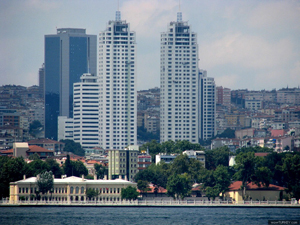Why should I buy property in Turkey?
Price: The real estate sector in the developed economies is subject to considerable bubbles. The prices are highly inflated; and the value of the real estate investments referred to as “non-tradable” in the developed countries, far from increasing, is expected to fall in future. On the other hand, the prices in Turkey have a serious potential to increase, and therefore, an investment in real estate, not only is in no danger of decreasing in value, but appears to have a considerable potential to increase in value.
Legal Infrastructure: Turkey is a state based on law, governed by a complete democracy, where all the procedures of any of the units of the government are subject to judicial control. A strong assurance is provided by the judicial system, which operates justly, has effective built in checks and appeal procedures, and, being based on international agreements, recognises ECHR and other similar international judicial institutions. When making an investment in Turkey, there will be no issue of being victimised as a result of any arbitrary behaviour of the government or the judiciary.
Turkey is a country where different cultures and life styles live together with respect to each other. It is a place where anybody who respects the law and the rights of others can feel at home.
In Turkey you can find:
- Excellent and varied education and learning possibilities,
- Excellent and varied health services,
- A variety of excellent cultural activities to choose from,
- A wonderful climate and different alternatives.

Why should I invest in Turkey?
Turkey is a state based on law, governed by a complete democracy, where all the procedures of any of the units of the government are subject to judicial control. A strong assurance is provided by the judicial system, which operates justly, has effective built in checks and appeal procedures, and, being based on international agreements, recognises ECHR and other similar international judicial institutions.
When making an investment in Turkey, there will be no issue of being victimised as a result of any arbitrary behaviour of the government or the judiciary.
In addition, Turkey is geographically situated between the West and the East, and is a party to the European Customs Union. It has bilateral agreements with many Middle Eastern countries and also very close relations and cultural ties to the Caucasus and the Turkic Republics. Turkey provides a wide reach to all of these markets.
- Turkey has a young population of 70 million which provides a young and dynamic market in itself,
- It is a competitive country with a variety of skillsets and a high quality work force,
- It has a well established infrastructure in the areas of transport, storage, manufacturing, communications, education and health.

LEGAL ASSESSMENTS REGARDING ACQUISITION OF REAL ESTATE IN TURKEY BY FOREIGNERS
The fundemetal tenets which are referred to most frequently with regards to real estate acquisition by foreigners are the “principle of reciprocity” and “compliance with legal restrictions”. A new legal arrangement abolishing the principle of reciprocity is expected to come in force soon in Turkey. This will mean that the principle of reciprocity will be rescinded under certain conditions which wil be determined.
The principle of reciprocity is applied between at least two countries and means that the parties which have signed up to it give their respective citizens the same or similar rights. Under Turkish Law, due to the principle of reciprocity, regarding the acquisition of real estate by foreigners in Turkey, the condition which has to be met is that Turkish citizens also have the legal and actual right to acquire real estate in the countries of these foreigners in question.
The priciple of “compliance with legal restrictions” can be defined as follows: taking into account the differences between the countries, foreigners will be entitled to acquire real estate only within legal restrictions set out by the country in question. Regarding the legal restrictions applied to acquisiton of real estate by foreign real persons in Turkish Law, the most prominent examples are the Law of Prohibited Military Zones and Security Zones numbered 2565, and the regulations based on the Law of Reprisal numbered 1062.
ACQUISITION OF REAL ESTATE BY FOREIGN REAL PERSONS
Foreign real persons can aquire real estate in Turkey to be used as a work place or residence, on condition that there is reciprocity and compliance with the legal restrictions; and only if the real estate in question is designated and registered for such purposes in the zoning plan or adjusted local zoning plan.
ACQUISITION OF REAL ESTATE BY FOREIGN COMPANIES
Foreign commercial companies which are legal entities under the laws of the country they are founded in, can acquire ownership of real estate and/or limited real rights in Turkey only within the scope of special law provisions.
1- 1- Pursuant to Article 8/E of the Tourism Promotion Law numbered 2634, it is possible to be exempt from the terms and restrictions set by Article 35 of the Title Deed Act numbered 2644 on condition that the company operates in the tourism sector in areas which, in the zoning plan, are designated for use in tourism. Therefore, a foreign company an acquire real estate for this purpose in such designated areas. Pursuant to Article 8/D of the same Law, the Ministry of Tourism can grant an easement and an imprescriptible and substantive surface right (defined as real estate under Civil Law) for real estate in these specified areas to foreign commercial firms which possess a tourism investment licence. However, such real estate must be situated within areas which are preserved for tourism in zoning plans or a zoning plan must be produced (adjusted zoning plan) to enable tourism investment.
2- 2- Pursuant to Article 12/2 of the Petroleum Law numbered 6326, Foreign companies can acquire the necessary real estate and limited real rights to drill for oil by permission from the Cabinet.
3- 3- Foreign companies can be granted easement on real estate which are situated in the zone areas set up pursuant to the Industrial Zone Law numbered 4737, and in accordance with Article 4 of this law.
Pursuant to Article 35 of the Title Deed Act numbered 2644, acquisition of real estate in our country is not possible for legal entities other than commercial companies which are legal entities under the laws of the foreign countries they are founded in.
ACQUISITION OF REAL ESTATE BY COMPANIES WITH INTERNATIONAL CAPITAL
Companies with international capital are essentially Turkish companies, and they are Local Companies for which aquisition of real estate is possible on condition that this acquisition accords with the company’s field of activity based on the type of its partnership or its capital. The terms of the real estate acquisition for such companies are set out in Article 36 of the Title Deed Act numbered 2644. According to this, companies with foreign capital can acquire as much real estate as they wish, on condition that this acquisition is required as part of their company’s activities (the condition which states the requirement as part of the company’s activities may be changed in the new Commercial Code). If however, the real estate in question is situated within a prohibited military zone or a military security zone or a strategical military zone, permission from the Office of The General Staff is required; and, if it is situated within special security zones, permission from the Home Office is required.
I. WHERE TO APPLY
Pursuant to Article 26 of the Title Deed Act numbered 2644, the duty and authority to set out agreements regarding ownership and regarding real rights other than ownership is granted to the Title Deeds Registry Office.
II. DOCUMENTS REQUIRED FOR THE APPLICATION
There is no difference between foreigners and Turkish citizens regarding the documents required for the application
A) APPLICATION BY REAL PERSONS:
- The title deed of the real estate if there is one. If there is no title deed, then a document showing the lot number of the real estate and a verbal declaration of the owner,
- An identification document or passport issued by the country of citizenship and two passport photos,
- If the applicant is a representative, the power of attorney in regards to the representation together with a photo ID and a passport photo of the representative. If there are many buyers and some of them are not present, then photo ID’s, passport photos of the representatives of the absent buyers together with documents in proof of the representation.
B) APPLICATION BY LEGAL ENTITIES
- Companies which are founded pursuant to the Foreign Direct Investment Act numbered 4875 have to present a certificate of authorisation obtained from the Trade Registry Office; the list of authorised signatures, and a power of attorney given to the person authorised based on this list,
- Foreign companies founded in foreign countries in accordance with their own laws have to present a document as a certificate of authorisation obtained from the authorities as required by the legislation of the country in which they are founded.
There is no difference between foreigners and Turkish citizens in regards to the fees and taxes which need to be paid as part of the title deed procedures.
